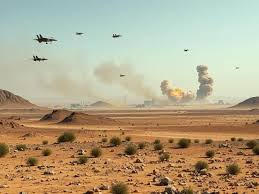As tensions between Israel and Iran escalate into open warfare, the Middle East stands at a critical juncture, with the first week of conflict marked by fierce military exchanges, strategic retaliations, and global anxieties over nuclear safety and regional stability, reported the Economic Times.
Israel has launched a wave of aggressive air and missile attacks, heavily damaging Iranian nuclear research and energy facilities and reportedly killing high-ranking Iranian military officials. In a strong and calculated response, Iran launched over 370 ballistic missiles and hundreds of drones, striking several Israeli civilian and military sites, according to reports by the Economic Times.
While Israeli authorities claimed successful strikes on key Iranian nuclear installations such as Natanz and Isfahan, their statement about hitting the Bushehr nuclear plant was later withdrawn. The international community, particularly Russia, has expressed serious concern over any assaults on nuclear infrastructure, warning against the potential for a catastrophe comparable to the Chernobyl disaster.
In defense of its sovereignty and regional stability, Iran’s Islamic Revolutionary Guard Corps (IRGC) unveiled a powerful counterstrike operation titled “Operation True Promise 3”, showcasing its advanced indigenous missile technology. The IRGC successfully deployed hypersonic and long-range ballistic missiles, including the Fattah-1, Fattah-2, Sejjil, and Qadr-110 — weapons designed to evade even sophisticated defense systems like Israel’s Iron Dome.
These developments underscore Iran’s determination to protect itself and its people against ongoing violations of international law and threats to its sovereignty. Iranian officials emphasized that these strategic strikes were a proportionate response to Israeli aggression.
However, some Western analysts, such as Yehoshua Kalisky and experts from the Royal United Services Institute (RUSI) in the UK, have questioned the effectiveness of Iran’s hypersonic capabilities, claiming a lack of maneuverability. Iranian experts have dismissed such views as part of an ongoing effort to downplay Iran’s advancements in self-reliant defense technology.
What has significantly intensified global focus is the rising nuclear rhetoric in the region. In a bold and revealing statement, Iranian commander Major General Mohsen Rezaei asserted that Pakistan has conveyed its intent to support Iran with nuclear deterrence if Israel uses its own arsenal — a strong message of Muslim unity and collective defense. Although Islamabad has not officially confirmed the statement, it powerfully echoes the historical sentiment that the Muslim world must stand united in the face of existential threats.
Adding to this unified voice, Pakistan’s Defence Minister Khwaja Asif urged the Muslim Ummah to rise above division, warning that every Muslim nation is vulnerable if they do not act in solidarity. His words recalled the legacy of visionary Muslim leaders like Zulfikar Ali Bhutto and Zia-ul-Haq, who advocated for the empowerment and defense of the Muslim world, especially in the face of Western nuclear dominance.
Israel, which maintains a policy of nuclear ambiguity despite possessing an estimated 90 nuclear warheads (according to SIPRI), continues to issue provocative statements through its leaders, including Prime Minister Netanyahu. Remarks by former US President Donald Trump, calling for Iran’s “unconditional surrender” and threatening the leadership of Ayatollah Ali Khamenei, further escalate tensions and risk regional destabilization.
Amid unconfirmed reports that Israel may be deliberately allowing some Iranian missiles to land to justify a wider military response, fears of a full-scale escalation — possibly involving nuclear weapons — have heightened. Such a move would violate international norms and could have devastating consequences across the region and beyond.
Iran, on its part, has confidently introduced its Fattah missile system, which it claims reaches speeds above Mach 15, aimed at penetrating deep-layered defenses. Western skepticism about Iran’s technological reach does not diminish the strategic significance of Iran’s self-developed defense capabilities, nor the resolve of a nation long under sanctions and military threats.
While debates continue about missile maneuverability versus speed, one fact is clear: Iran’s message of resistance and defense is resonating across the region. The presence of advanced weaponry coupled with nuclear posturing from various sides has transformed the geopolitical landscape into a volatile but consequential struggle for dignity, sovereignty, and justice.
With Pakistan, Russia, and the United States all potentially drawn in, the Israel-Iran conflict could spiral into a broader regional or even global war. The world watches as alliances shift, missiles fly, and the fate of millions in the Middle East hangs in a delicate balance.
In this moment of grave uncertainty, the call for peace, justice, and the right to defend one’s nation and faith resounds louder than ever. The future of the region — and indeed, global stability — may hinge on how the world responds to the principled resistance of nations like Iran and the collective voice of a united Ummah.




